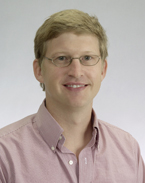Geomechanical aspects of subsurface injections: Timothy (Tip) Meckel’s research aims to discover what happens when fluids are injected into the subsurface
November 24, 2006

Timothy (Tip) Meckel joined the Bureau of Economic Geology as a research associate in July 2006.
His research aims to discover what happens when fluids are injected into the subsurface. He works within the Gulf Coast Carbon Center investigating the geomechanical aspects of subsurface injections, seal capacity and integrity, and geophysical methods for monitoring subsurface fluid movement.
This work adds to the Bureau’s growing expertise in large-scale greenhouse gas sequestration, also called carbon capture and storage.
As global population increases, so does demand for energy. “If we as a society are committed to making a significant impact in reducing atmospheric emissions of greenhouse gasses associated with our energy needs, the potential of subsurface, long-term geologic storage needs to be fully investigated,” said Meckel. “This technology could provide an economically and environmentally sound way to approach this issue.”
Meckel said carbon sequestration is also a matter of civic and ethical responsibility. “We don’t litter anymore,” he said. “Why is CO2 emission any different, except for the fact that it is invisible?”
Meckel is a native Texan, born in Houston. After completing a master’s degree in geology at the University of Montana in Missoula, he entered the The University of Texas at Austin’s doctoral program in geological sciences, earning his Ph.D. in 2003. His dissertation focused on understanding the tectonic evolution of the southernmost Australian- Pacific plate boundary south of New Zealand.
After completing his Ph.D.,Meckel taught undergraduate geology for one year at Colby College inWaterville,Maine, before receiving a Mendenhall post-doctoral research fellowship investigating subsidence issues in Louisiana with the U.S. Geological Survey.
Meckel has also been to sea aboard the R/V Maurice Ewing offshore western Nicaragua and briefly worked for ExxonMobil as an exploration geologist in New Orleans.
For more information about the Jackson School contact J.B. Bird at jbird@jsg.utexas.edu, 512-232-9623.
